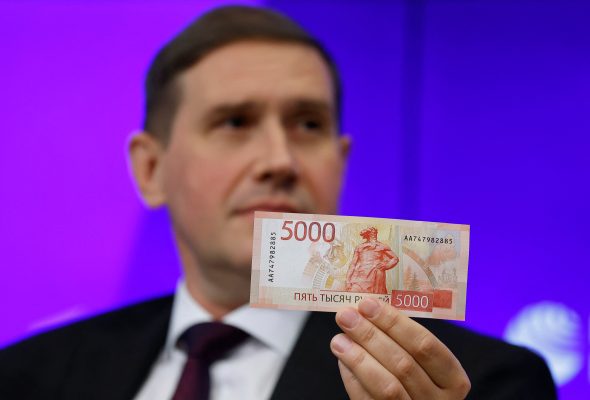Yes, the Soviet military backed attempts to erase Israel through support for Arab armies in wars from the 1960s onwards. And yes, it was perplexed and pained by Israel’s destruction of Soviet-trained and Soviet-equipped armed forces.
But there was serious admiration too, both for the military and for Israel’s intelligence services.
All of that changed dramatically with the Hamas attack on October 7. Russian pro-war Telegram channels were flooded with photographs of Israeli tanks and comments like “Another Merkava is burning brightly . . . apparently, the IDF leadership completely slept through the lessons of the SVO [Special military operation, the Kremlin’s term for its war in Ukraine.] and is resting on the laurels of long-past victories,” military expert Boris Rozhin, who is close to the Russian forces fighting in Ukraine, said on Telegram.
A military correspondent for Komsomolskaya Pravda, Alexander Kots, posted on October 7: “After today, I wouldn’t be surprised if they [IDF] march into the Palestinian enclave in columns, to be burned by drones.”
Many Russian military commentators gleefully empathized with Hamas’s use of lessons from the war in Ukraine, and the IDF’s inability to do the same.
So what’s going on here? Well, quite a lot.
Firstly, these comments unmask the acute psychological trauma suffered by the Russian military after its disastrous offensive against Ukraine in the early months of 2022. Not only was Russia’s military mauled by its supposedly inferior Ukrainian counterpart, but it was subjected to widespread derision from numerous Western and other experts. That loss of global respect is hard to bear for a nation with a proud military tradition. So, the relief offered by Hamas has triggered an avalanche of schadenfreude. You laughed at our incompetence? Now it’s our turn.
Secondly, there is a deep-seated Russian disdain for all Arab militaries.
That can be traced back to the drubbing delivered by Israel to Arab armies in the Six-Day War of 1967. It marked a huge change of opinion within the military ranks. Israel’s absolute victory was explained by the Soviet officer corps as attributable to the “poor fighting capabilities of the Arabs,” according to Victor Suvorov, a tank commander in 1967, and later a GRU defector to the UK, who described the feeling of confusion and dismay among the ranks of his army comrades in his book The Liberators. My life in the Soviet Army.
How else to explain why all that Soviet military help, combined with Soviet military aid, including advanced weapons systems, failed to bring victory over the Israelis?
Ever since, the Soviet army’s disdain has been combined with vulgar xenophobia towards Arabs. The Israeli forces, on the other hand, were put on a pedestal. And that feeling continued, uninterrupted, as the Soviet Union collapsed and the Russian army was born.
Thus Russian military accounts also posted xenophobic responses to events, designed to show the supposed stupidity of Hamas militants; one derided a Palestinian standing in front of a captured Merkava tank with a screwdriver.
If this seems contradictory, that’s because it is. It is of course true that the KGB orchestrated antisemitic campaigns in Soviet society, which was explained in propaganda by the “aggressive stance of Israel.” Russian security services and politicians remain deeply antisemitic to this day.
It openly assisted Arab countries throughout the Cold War and still claims an anti-colonial link to their “struggle”. Past aid extended from military support to assistance for Israeli adversaries, including militant and terrorist groups. Cold War-era Palestinian militants rested and recuperated in Czechoslovak spa towns like Karlovy Vary in between missions, where they would meet KGB staff based at the consulate.
In the early 2000s, the Russian security services also joined the ranks of admirers of the Israeli military and of Israeli special forces and intelligence agencies.
The authors remember a conversation with an officer of the FSB Vympel group, the most famous special operations unit of the FSB, which had been formed in the early 1980s to conduct special operations abroad but spent most of the 1990s and 2000s fighting militants in the North Caucasus.
Sergei Shavrin, a decorated colonel, who received the Hero of Russia award for saving the lives of his soldiers during the siege of Grozny, told us: “Take a look at Mossad [hit squads]. Why can’t we do the same with our terrorists abroad?”
Shavrin was clearly impressed by the efficacy and ruthlessness of Israeli operatives, launching global manhunts like the 1970s assassinations of the Munich Olympic terrorists in Operation Wrath of God.
Two years after that conversation, Putin introduced legislation allowing Russian agencies to conduct assassinations abroad, in clear imitation of the Israeli approach, although right from the start the list of targets included Putin’s personal political enemies.
In truth, Russia’s targeted assassination campaign has had mixed results. Opponents have been killed but the political and diplomatic costs were enormous, and the Russian security service’s reputation was hardly helped after botched attacks like the 2018 Salisbury poisonings. They arguably even laid the groundwork for the West’s united response to Russian aggression in 2022.
And whatever the failings of the Israeli military and security services (which are clearly very serious indeed), it does little to improve the image of Russia’s military, which has been badly damaged by its campaign in Ukraine. That doesn’t seem like anything to celebrate.
Andrei Soldatov and Irina Borogan are Nonresident Senior Fellows with the Center for European Policy Analysis (CEPA.) They are Russian investigative journalists, and co-founders of Agentura.ru, a watchdog of Russian secret service activities.
Europe’s Edge is CEPA’s online journal covering critical topics on the foreign policy docket across Europe and North America. All opinions are those of the author and do not necessarily represent the position or views of the institutions they represent or the Center for European Policy Analysis.





